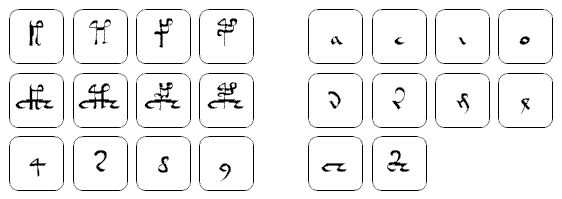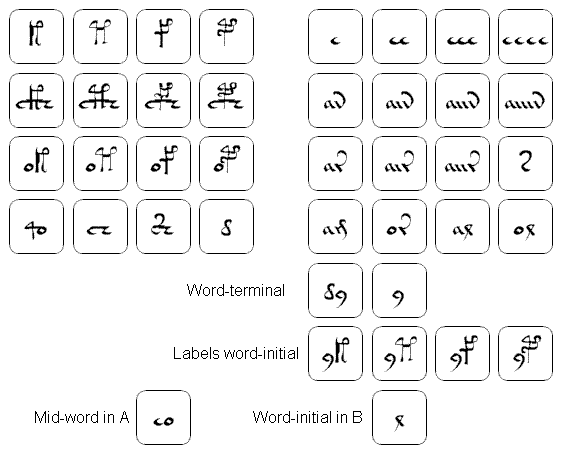I recently bumped into a “Random Freebie” from blogger “Miss Black Pepper”: apropos of nothing much, she posted up a Voynich Manuscript Scrabble Tile Set, composed of nice little images clipped from the Voynich Manuscript (which she happens to rather like).
Of course, this set me wondering what a real Voynich Scrabble would look like. You see, the most appalling thing about this idea is that it is actually possible, in much the sameway that you don’t need to know what an ULVA is (don’t ask, but many people apparently eat it) to use it to score in Scrabble.
For Voynichese, the problem is that the alphabet used for most transcriptions (called EVA Hand 1) is a stroke-based alphabet, designed to capture what the letters look like (rather than what they are). Though elegant in its own linguistic way, this unfortunately led to a number of (frankly) rather odd design decisions, with a number of apparently unitary “glyphs” being split up into overlapping component bits. If you reassemble the most obviously glyph-like stroke groups back into glyphs, you could just about get a moderately workable set of Scrabble tiles. Note the four tall letters in the top-left row (these are called “gallows”) and the four “vowel-like” glyphs in the top-right row (these are transcribed as “a, e, i, o”).

Voynich Scrabble tiles (using the EVA transcription)
Voynich researchers have spent a lot of time working out abstract models for Voynichese, tiny generative grammars that attempt to predict what should (or indeed shouldn’t) be a valid Voynich word: Jorge Stolfi’s “core-mantle-crust” paradigm is one such model. But the awkward fact remains that none of these works massively well, either generating many more words than actually appear or generating far too few words of those that do appear in the ms.
(And anyway, the question remains what kind of vocab could ever be algorithmically generated… but let’s stay on track here).
You could use Voynichese tiles to play one of two basic types of Voynich Scrabble:
- You can only play words that actually appear in the Voynich Manuscript
- You can only play words as predicted by [Person X]’s generative grammar
(Quick hint: don’t play rule-set #1 against Philip Neal or Glen Claston, they’ll probably thrash the pants off you.)
Another factor that hasn’t been considered enough is the specific language differences that occur within the Voynich Manuscript. Prescott Currier identified ‘A’ and ‘B’ languages: but labels have a different usage pattern too, as do line-initial, paragraph-initial and word-initial letters. And so you might add a special kind of dialect ‘mode’ to your Voynich Scrabble, that only lets you play ‘A’-language words or ‘B’-language words (or label words) at certain times.
However, one problem I have is that I simply don’t trust the so-called ‘Voynich vowels’. For example, Voynichese ‘o’ functions in so many different ways within the text that I cannot easily believe it is a letter per se: rather, I would argue that it is a multi-function ‘trick’ token, that performs different jobs in different contexts. I’m also deeply suspicious about the ‘a’ and ‘i’ letters, particularly when they appear in ‘aiin’ groups: I argued in my book that these are used as a kind of visual framework to encode numbers using the backwards flourish of the “n” (which seems more like a ‘v’). And so I think the ‘vowels’ form a great big hole for linguists to jump willingly into (but that’s another story entirely).
Anyway, given that I have also long suggested that a small set of letter-pairs / letter-groups would form a more usable starting point for cryptanalysis than ‘raw’ EVA, here are the tiles I’d expect the original author to be most comfortable playing with (you’ll notice the absence of free-standing ‘a’, ‘i’ and ‘o’ from the set). Agree or disagree, here they are:-

Voynich Scrabble (using Nick Pelling’s verbose pairs)
Happy Voynich Scrabbling! 🙂
PS: OK, “ulva” is the name of the sea lettuce ulva lactuca, an edible algae / seaweed. Aren’t you glad you don’t play Scrabble competitively? 🙂